
"Skin Trade" is the second single from Duran Duran's Notorious album, and the band's 15th single in total. It was released in January 1987, reached #22 on the UK Singles Chart, and #39 on the Billboard Hot 100.
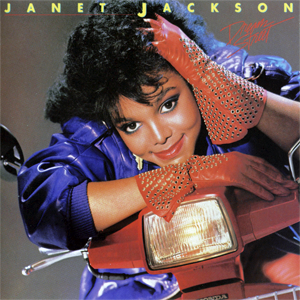
Dream Street is the second studio album by American musician Janet Jackson, released on October 23, 1984, by A&M Records. More pop than her debut album's "bubblegum soul" feel, the album was not the runaway success that Janet's father Joseph thought it would be, peaking at No. 147 on the Billboard 200 in 1984. The album did have one modest hit for Jackson, the Top 10 R&B single, "Don't Stand Another Chance", produced by brother Marlon. Also, the video for the song "Dream Street", her first music video, was shot during the shooting of the TV show Fame.

"Nathan Jones" is a song by American girl group the Supremes from their twenty-third studio album, Touch (1971). It was released on April 15, 1971, as the album's lead single. Produced by Frank Wilson and written by Kathy Wakefield and Leonard Caston, "Nathan Jones" was one of eight top-40 entries the Supremes recorded after its original frontwoman, Diana Ross, left the group for a solo career.
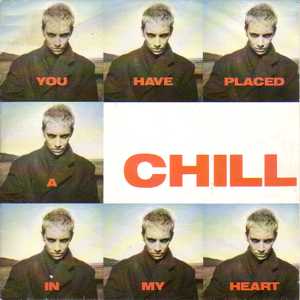
"You Have Placed a Chill in My Heart" is a song by British pop duo Eurythmics. It was written by group members Annie Lennox and David A. Stewart, and appears on the duo's sixth studio album, Savage (1987). It was released as the fourth and final single from the album in the United Kingdom and as the second in the United States. In the first, it was the only single from the album to reach the top 20 on the UK Singles Chart, peaking at number 16.

Reputation is the thirteenth studio album by British singer Dusty Springfield, and twelfth released. Issued on the Parlophone Records label in the UK and the rest of Europe in June 1990, Reputation was not only Springfield's first studio album in eight years at the time but also her first album to be released in her native UK since 1979's Living Without Your Love. After a string of commercially overlooked albums through the late 1970s and early 1980s Reputation finally managed to resurrect Springfield's career and belatedly resulted in her being re-evaluated and recognised by both music critics and the general public as the UK's foremost 'blue-eyed soul' singer. Mainly produced by Pet Shop Boys and Julian Mendelsohn and recorded in the UK over a period of some eighteen months, Reputation became her highest charting and best-selling album in the UK since 1970's From Dusty with Love, peaking at No. 18 and selling 60,000 copies within two weeks of its release.
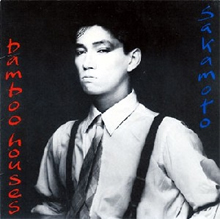
"Bamboo Houses" is a song by Japanese musician-composer Ryuichi Sakamoto and English singer-songwriter David Sylvian, released on Virgin Records in 1982. It reached number 30 in the UK charts in the second week of August 1982.

"Sanity" is Killing Joke's second single from their sixth studio album, Brighter Than a Thousand Suns. It was released on 30 October 1986. The single peaked at No. 70 in the UK Singles chart. All of the releases were mixed by Julian Mendelsohn and Zeus B. Held, and produced by Chris Kimsey.
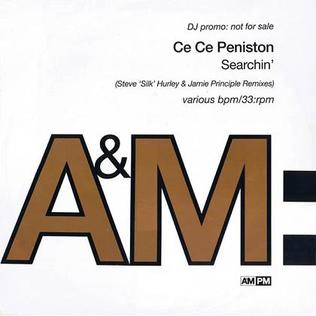
"Searchin" is a 1993 song by the musician CeCe Peniston, taken from her second solo album Thought 'Ya Knew on A&M Records.

"(He's a) Shape in a Drape" is a song by British singer-songwriter and musician Joe Jackson, which was released in 1988 as a single from the soundtrack album of the American biographical comedy-drama film Tucker: The Man and His Dream. The song was written and produced by Jackson.

One Step Beyond. .. is the debut studio album by the British ska-pop group Madness, released by Stiff Records. Recorded and mixed in about three weeks, the album peaked at number two and remained on the U.K. Albums Chart for more than a year. The album has received much critical praise. It was ranked 90th in a 2005 survey held by British television's Channel 4 to determine the 100 greatest albums of all time.
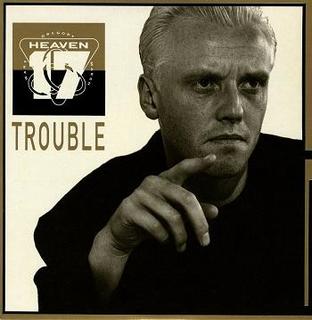
"Trouble" is a song by the British new wave and synth-pop band Heaven 17, which was released in 1987 as the second and final single from their fourth studio album Pleasure One. It was written and produced by Glenn Gregory, Ian Craig Marsh and Martyn Ware. The song peaked at No. 51 in the UK and spent four weeks on the chart. It was a bigger success in Germany where it reached No. 17.
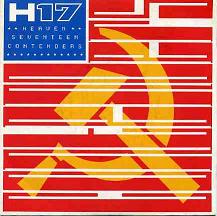
"Contenders" is a song by the British new wave and synth-pop band Heaven 17, which was released in 1986 as the first single from their fourth studio album Pleasure One. It was written and produced by Glenn Gregory, Ian Craig Marsh and Martyn Ware. The song reached No. 80 in the UK and spent four weeks on the chart. It also reached No. 6 on the U.S. Billboard Dance/Club Play Singles Chart.

"Wherever Would I Be" is a song by American rock band Cheap Trick, released in 1990 as the second single from their eleventh studio album Busted. It was written by American songwriter Diane Warren and produced by Richie Zito. "Wherever Would I Be" peaked at number 50 on the US Billboard Hot 100.

The Ward Brothers were a British pop-rock band, who scored a top 40 hit in the UK with their 1986 single "Cross That Bridge".

"I Can See It" is a song by English synth-pop duo Blancmange, released in April 1986 as a non-album single. The song is a re-recorded version of "Why Don't They Leave Things Alone?", which appeared on the duo's third studio album Believe You Me (1985). It was written by Neil Arthur and Stephen Luscombe, and produced by Greg Walsh. "I Can See It" reached number 71 in the UK Singles Chart and remains the duo's last appearance in the chart. Shortly after the single's release, Blancmange decided to disband.

"Working on It" is a song by British singer-songwriter Chris Rea, released in 1989 as the fifth and final single from his compilation album New Light Through Old Windows (1988). It was written by Rea, and produced by Rea and Jon Kelly. "Working on It" reached No. 53 in the UK and No. 73 on the US Billboard Hot 100. It also topped the Billboard Mainstream Rock chart.

Madness of It All is the debut studio album from the British pop-rock band The Ward Brothers, which was released by Siren in 1987.
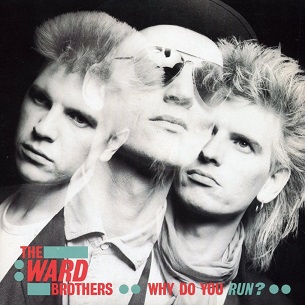
"Why Do You Run?" is a song by British pop-rock band the Ward Brothers, which was released in 1987 as the third single from their debut studio album Madness of It All. The song was written by Graham Ward and produced by Mike Howlett. As the follow-up to the band's UK Top 40 hit "Cross That Bridge", "Why Do You Run?" reached No. 81 on the UK Singles Chart and remained in the Top 100 for two weeks.

"Down to London" is a song by British singer-songwriter and musician Joe Jackson, which was released in 1989 as the second single from his eighth studio album Blaze of Glory. The song was written and produced by Jackson.
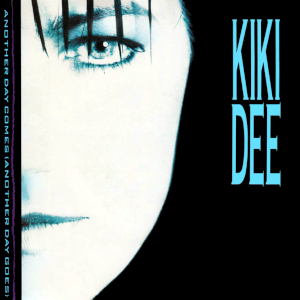
"Another Day Comes (Another Day Goes)" is a song by English singer Kiki Dee, released in 1986 as the first single from her eighth studio album Angel Eyes. The song was written by David A. Stewart and produced by Stewart and Patrick Seymour.




















